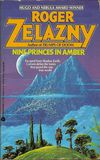
When I started The Chronicles of Amber, I’m not really sure what I expected. Probably a straight forward fantasy epic a la The Lord of the Rings.
Not exactly.
Nine Princes in Amber actually feels more like science fiction at times, with infinite parallel worlds that the protagonist(s) can travel freely between. The catch is that there’s only one ‘real’ world: Amber, of which all others (including our Earth) are merely reflections.
We start with one of the Princes of Amber (Corwin) stuck on our Earth somewhat lacking in memory. He doesn’t know anything about Amber or all this parallel world nonsense (yet). It’s an interesting narrative structure to let the reader learn all about the world without dropping them in the deep end. I appreciate that and think it was done fairly well.
When we finally get moving into Shadows, into Amber’s reflection Rebma (I see what you did there..) and finally into Amber itself, the worlds we travel through are fascinating. I could imagine spending a long time just traveling from world to world were I a Prince of Amber, just to see what all is possible.
That being said, if you’re looking for a ‘good’ protagonist to root for, Corwin is not it. Neither really is any
Style wise, the book is odd. You get pure high fantasy writing chock full of thees and thous mixed in with bits like this:
“I walked among Shadows, and found a race of furry creatures, dark and clawed and fanged, reasonably manlike, and about as intelligent as a freshman in the high school of your choice-sorry, kids, but what I mean is they were loyal, devoted, honest, and too easily screwed by bastards like me and my brother. I felt like the dee-jay of your choice.”
To some extent, it makes sense. Corwin has spent centuries growing up in Amber and then centuries more living on our Earth up to the then present day of the 1970s. It’s still jarring to read though.
Otherwise, there’s something to be said about the inherent sexism more common in 70s literature. The men are the doers and shakers, the drivers of the story. The women are mostly background noise and sounding boards more than anything. From time to time, they seem involved in plots (like getting Corwin locked away just before the book begins), but even Corwin remarks from time that the battle for the throne is among the brothers, a Queen of Amber never even crosses his mind.
The final run up towards the end is interesting as well. They’re assaulting Amber itself, over mountains and on the sea. It’s an interesting choice to basically paint thumbnail sketches of their journeys: And then we fought a sea monster. Ten thousand men died.
They’re really not much more detailed than that. I could have used more of the battles, they sound interesting, but I think it actually works. It drives up the tension right up to the climax… only for Corwin to be cast into the dungeons and blinded. I see why the book tends to be bound into a single volume as The Chronicles of Amber .
Overall, it’s an interesting story. More than enough to get me to want to read the rest of the series, but probably not enough to want to re-read in the future. We shall see if any of the latter books changes my mind.
Aside/rant: What does it actually mean for Amber to be the only real world? What makes the others less real? I guess you can possibly manipulate the Shadow on other worlds to do interesting things, which wouldn’t work on Amber? Other than that, why exactly does everyone want to bother with Amber? They have infinite universes to travel, in many (all?) of which, they are basically gods. Why not make a thousand kingdoms you can rule if that’s what you’re interested? Or travel forever? Or settle down somewhere interesting (but not too interesting)?